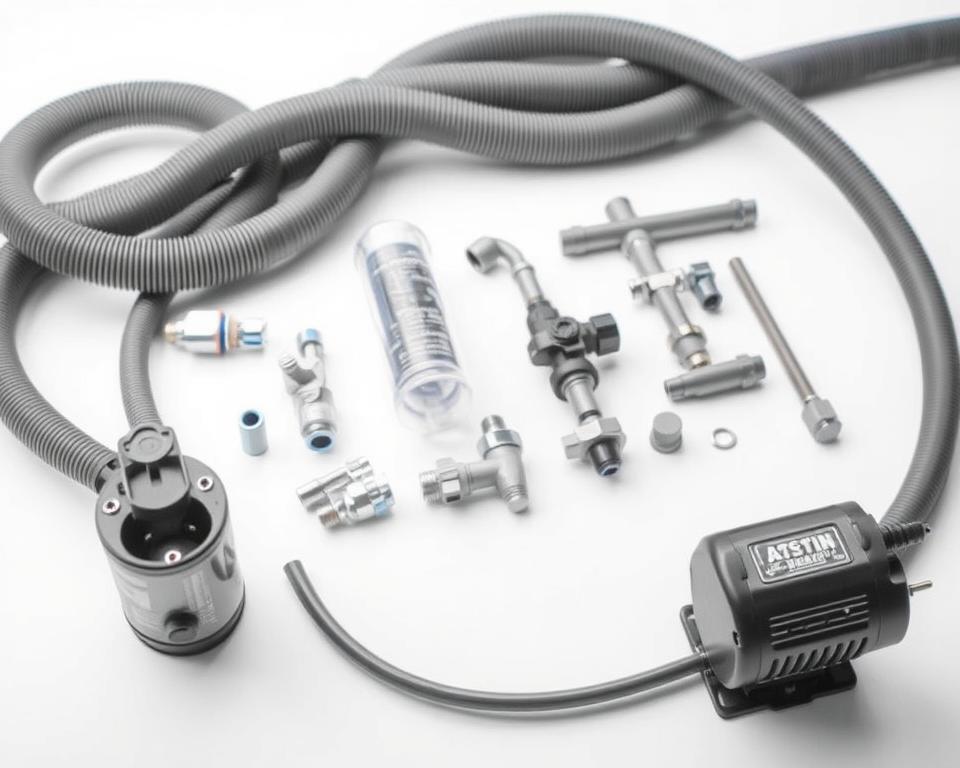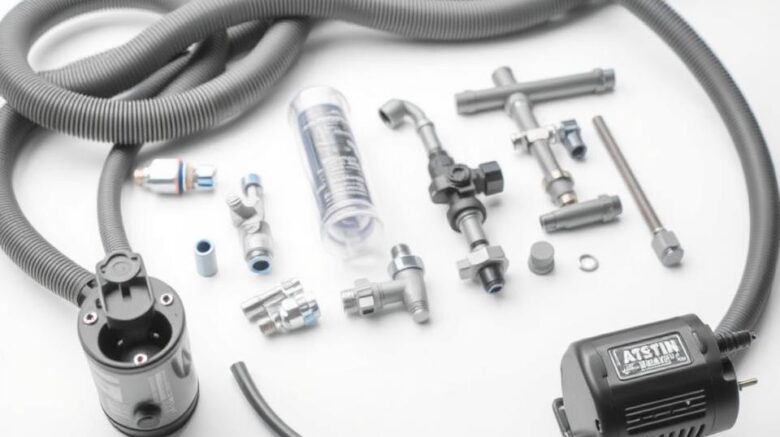Replacing a Septic Tank Pump: The Essential Guide
Have you considered the aftermath of a Septic Tank Pump shutdown? For many, it’s a event that creates considerable anxiety and sudden financial hits. Identifying the necessity for timely replacement is critical in preserving a smooth and clean Septic system. By sticking with consistent system checks, including prompt repair needs, you prolong your system’s life while avoiding high emergencies. Companies like All in Sanitation play a key function in maintaining your Septic tank operating smoothly. This guide aims to provide a concise explanation of Septic Tank Pump replacement, exploring indication signs and maintenance tips for RV septic tank pumping cost.
Summary Highlights
- Knowing the job of a Septic Tank Pump is crucial for homeowners.
- Prompt Septic Tank Pump replacement can save you money in the long run.
- Scheduled upkeep and cleaning are key to increasing the lifespan of your Septic system.
- Qualified service can successfully tackle Septic system Pump repair and maintenance.
- Identifying first indicators of Pump failure can ward off high repair bills.
Understanding Your Septic System
A Septic system is crucial for homes without access to public sewers. It treats and disposes of household wastewater safely. The Septic tank is core to this system’s operation, serving an important role in the process.
The Septic tank collects sewage, separating solids from liquids and scum. This division is vital for proper wastewater treatment. The clarified water then flows to the drain field, where it receives further purification by the soil, safeguarding groundwater.
Grasping how your Septic system functions can increase its life and efficiency. Ongoing service is critical for the Septic tank and the system’s overall condition. Homeowners must know their system’s components to protect the environment and avoid pricey renovation.
Septic Tank Basics
A Septic tank is a buried, sealed container integral to household waste management systems. It’s important to understand the Septic tank’s main role: it manages sewage waste storage by processing it. This setup works by separating solids from liquids, enabling basic wastewater treatment and sanitation.
Its operation depends on naturally occurring microorganisms that break down waste. In regions without centralized sewage treatment, Septic tanks are necessary. They hold sewage long enough for solids to sink, forming sludge. Meanwhile, liquid effluent floats upward, allowing filtration in the drainage field.
Keeping a Septic tank in optimal state is crucial for its reliability and durability. Regular maintenance is key to avoiding problems like backups and overflows. These situations can lead to expensive repairs and pose ecological threats. In essence, Septic tanks serve an important function in keeping things clean and safe, especially in rural areas.

Signs You Need a Septic Tank Pump Replacement
Homeowners should be alert of signs that their Septic tank may need a new Pump. A clear sign is experiencing foul odors at drains or in the yard, pointing to a system failure. Dealing with recurring or major sewage backups in your home needs swift action to head off worse issues.
Noticing slow draining drains indicates a potential problem. Household fixtures that drain sluggishly might mean a Pump failure or a clog that needs an expert’s evaluation. Additionally, areas of unusually lush vegetation in your yard could indicate trouble; this shows waste leakage, causing overflow concerns.
To avoid large, pricey repairs, homeowners should handle these indications quickly. Scheduling routine checks and maintenance is critical for the Septic system’s best function.
| Signs | Description |
|---|---|
| Foul Odors | Unpleasant smells around drains or yard signaling system failure. |
| Sewage Backup | Recurring overflows in sinks or toilets signaling potential Pump issues. |
| Slow Draining Drains | Fixtures draining slowly can point to blockages or Pump malfunction. |
| Lush Vegetation | Areas of overgrowth near the tank signaling possible overflow. |
When to Change Your Pump
Understanding the schedule for replacing your Septic Pump is vital for a smooth-running Septic system. It’s wise to have your system checked every three years. A skilled technician during these checks gives feedback into how well your system functions.
Typically, service of the Septic tank becomes required every five years. However, households with extensive use or a higher occupancy might need annual service. Proper care of your Septic system prevents costly repairs and extends its lifespan. Professionals in Septic services can create a maintenance plan that suits your demand and the details of your system.
Staying ahead with Septic Pump replacements guarantees your system’s efficient operation and defends your home investment. Routine reviews and maintenance avoid unforeseen costs. They keep your Septic system working smoothly.
Pump Replacement Pricing
The Septic Pump replacement cost changes, affected by many aspects. Homeowners should prepare to pay spending between $500 to $1,300 for a new Pump. This price range reflects changes in the model of Pump and material needs. It’s necessary to account for the Pump and Septic tank servicing costs for the setup and necessary inspections.
Costs can also increase due to problems within the Septic system or area labor costs. Needed fixes, resulting from wear or harm, could raise the total outlay. In reviewing financial estimates for Septic services, add charges for consistent maintenance, inspections, and any unforeseen emergencies since these factors greatly help with maintaining your system’s longevity.
Allocating funds for periodic Septic service lessens the surprise of unforeseen costs. Early budgeting aids homeowners in covering expenses connected with the Pump’s replacement and system upkeep.
Pump Replacement Procedure
The Septic Tank Pump replacement kicks off with a deep inspection of the system. This first check detects any additional issues beyond the Pump itself. The existing Pump is then removed properly and efficiently.
Installing the new Pump demands careful attention to tight connections, verifying no leaks. Professional Septic services see that the installation is properly executed, lowering future issues.
The concluding phase is a detailed finish inspection. It checks peak operation, granting homeowners assurance. With expert help, the process is straightforward, causing minimal disruption.
Best Practices for Installation
When undertaking Septic Pump installation, it’s vital to stick to best practices. Using skilled professionals confirms compliance with local regulations. They capably conduct the installation details, eliminating errors common in inexperienced setups.
Keeping to stringent Septic service standards is important for cohesive system operation. Choosing proper parts and reliable materials prolongs the Pump’s life and enhances the Septic system’s efficiency. This careful focus elevates maintenance and overall performance longevity.
- Select a well-reviewed service provider who specializes in Septic systems.
- Confirm that all necessary permits and inspections are in place before work kicks off.
- Install Pumps that suit the specific requirements of your Septic system.
- Incorporate a pre-installation inspection to check site conditions.
- Pay attention to the layout and flow of the Septic system during installation.
Following these guidelines ensures a hassle-free fit-out. It also delivers a reliable system for sound wastewater control.
Maintenance Advice
Stopping costly problems with your Septic system originates with routine care. By employing easy guidelines, homeowners can sustain their Septic systems’ efficiency. Setting up consistent assessments is a prudent measure. It helps identify and resolve problems before they become major.
It’s also vital to stop flushing harmful materials down the drain. Grease, chemicals, and items that don’t break down can injure your system. Cutting water use during peak times can also ease system load.
Engaging pro cleaning with entities like All in Sanitation is essential for Septic health. Understanding what you can and cannot do with your Septic tank can greatly prolong its lifespan and shield your household environment.
Cleaning Your Septic Tank
Periodic Septic tank cleaning is essential for your system’s long-range function and efficiency. The process involves extracting sludge, looking for issues, and confirming everything runs smoothly. These steps are critical to maintain smooth operation and ward off expensive fixes.
A robust Septic maintenance plan should contain regular inspections and cleanings that fit your specific usage. Homeowners must realize the importance of regular upkeep to sidestep difficulties like backups. Bringing in pros ensures the cleaning is thorough, fostering a healthier living space.
| Service Type | Frequency | Benefits |
|---|---|---|
| Pumping | Every 3-5 years | Wards off system failure and backups |
| Inspection | Annually | Detects potential issues early |
| Maintenance | As needed | Lengthens the lifespan of the system |
Spending on routine Septic tank cleaning lowers spending and extends your system’s life. It ensures smooth waste processing. Acting now secures your Septic system’s efficiency for the future.
Selecting the Right Service
Finding a reputable Septic service provider is crucial when replacing a Septic Tank Pump. Begin by confirming their certifications and licenses. Such credentials demonstrate the company’s compliance with industry norms, critical for a trouble-free replacement process.
Delving into customer reviews is also a key step. Past feedback shows service quality, helping with the filtering process. Opt for companies with a steady track record of high standards and customer support.
Listen to recommendations from your network too. Insights from friends and neighbors can unveil top-notch Septic services in your vicinity. Always seek detailed accounts of their successful projects with these services.
Finally, evaluate the work scope and cost from various firms. A careful analysis guarantees exceptional service and enhances the value of your expenditure. Keeping to these guidelines ensures your Septic system receives the premium care it requires.
When to Consider DIY vs. Professional Help
Homeowners often wonder whether to handle Septic issues personally or hire specialists. DIY Septic maintenance seems attractive for simple fixes and upkeep. For example, monitoring Septic tank levels or snaking lines can be done independently.
On the other hand, recognizing when to hire Septic professionals is critical for significant failures. Complicated repairs, replacing systems, or major clogs call for special tools and expertise. Without the proper expertise, attempts to fix these problems can cause environmental risks and large-scale damage.
Choosing between DIY and professional help demands judging the job’s complexity. Presented below are examples demonstrating when DIY is acceptable and when professional Septic services are advised:
| Situation | DIY Feasibility | Need for Professional Help |
|---|---|---|
| Routine maintenance (e.g., tank level checks) | Yes | No |
| Minor clogs in drain fields | Yes | No |
| Major Septic Tank Pump failure | No | Yes |
| Complex sewage backflow issues | No | Yes |
| Regular system inspections | Maybe DIY | Yes for thorough checks |
Choosing wisely on these matters secures safety and efficiency. Selecting well safeguards the Septic system but also sidesteps surprise expenses.
Conclusion
Understanding the workings of your Septic system is essential for its effective management and your home’s efficiency. Catching early indicators of issues prevents pricey repairs and safeguards the system’s health. This anticipatory approach helps the environment and raises your property value.
To keep your Septic system in prime condition, make sure of maintenance. This entails routine checks and timely professional Pumping. This reasonable spend protects your home’s safety and your wellbeing. Your Septic system functions best with proper care.
Our team at All in Sanitation is committed to supplying high-quality Septic care. We bring the skill essential to guarantee your system performing at its best, securing your home investment over time. With our emphasis on outstanding care and trustworthiness, we’re prepared for your Septic maintenance needs.
